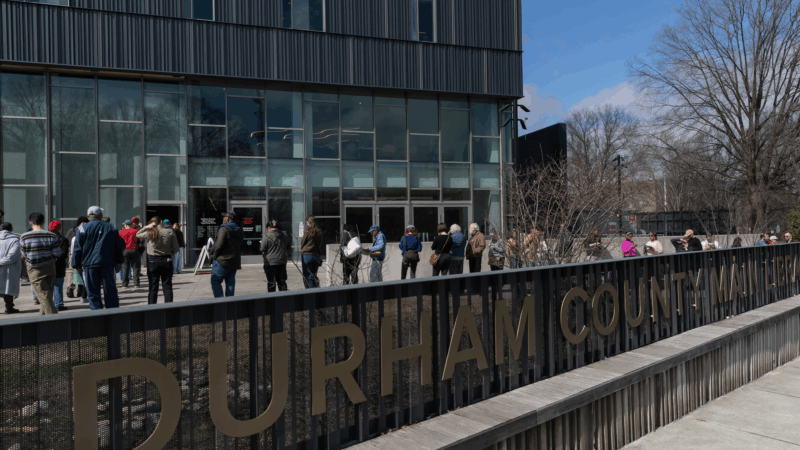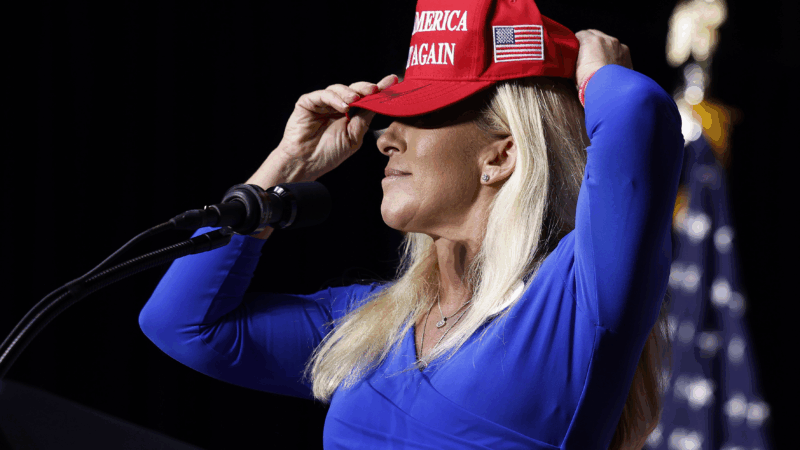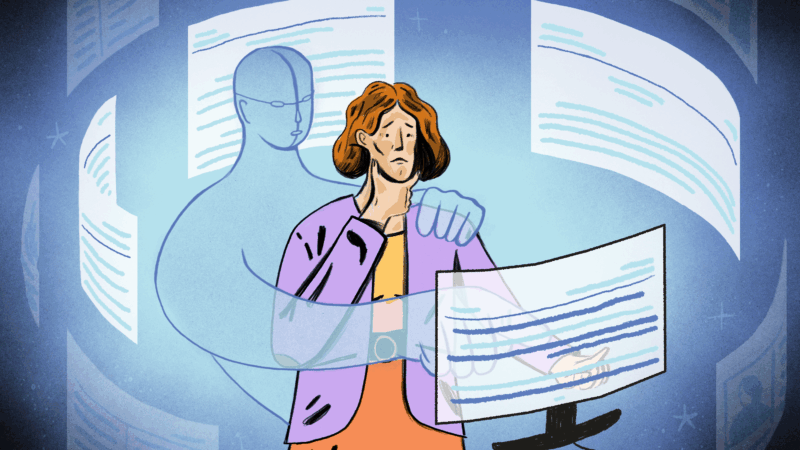Book bans are on the rise in the Gulf South. Here’s what’s being challenged in Alabama
Attendees wait to receive free copies of banned books from the Banned Wagon outside of the [Un]Ban Book Festival at Baldwin & Co. in New Orleans on Oct. 5, 2023.
By Drew Hawkins & Maya Miller/Gulf States Newsroom
The number of challenged books across the United States has risen dramatically in recent years — especially in school districts — driven by new laws and regulations limiting the kinds of books young people can access.
PEN America, which supports and protects First Amendment rights for writers and journalists, reported that more than 3,300 books were banned in public K–12 schools during the 2022-2023 school year — a 33% increase from the previous school year.
The vast majority of those challenges are from a vocal minority of individuals. According to a Washington Post investigation, only 11 people were responsible for filing 60% of challenges in 2022. In many cases, the challenged books are removed from student access before they’re even read, or before objections to the books are fact-checked for accuracy.
The majority of bans target books featuring LGBTQ+ themes or characters, books centered on racial inequality or include themes of race and racism, and books with themes of violence and sexual experiences.
Among the most challenged books is Toni Morrison’s “The Bluest Eye,” which explores the cruelty and pain wrought by racism, Khaled Hosseini’s “The Kite Runner,” a story set in Islamic Afghanistan, and Margaret Atwood’s “The Handmaid’s Tale,” a fictional novel set in a dystopian future where environmental disasters abound and women have no control over their reproductive health.
Also under attack are children’s picture books — especially ones with trans-affirming themes or characters. “I Am Jazz,” a picture book by Jessica Herthel and Jazz Jennings, relates Jennings’ experience growing up as a trans child. “My Rainbow,” an autobiographical picture book co-written by DeShanna and Trinity Neal, focuses on a time when DeShanna made a rainbow wig for her trans daughter, Trinity, to help support her transition.
Texas and Florida led the nation in attempts to ban books in 2022, but the fierce debate has also bled over into the Gulf South.
Here’s the latest on what each state has done to ban or restrict book access:
Alabama
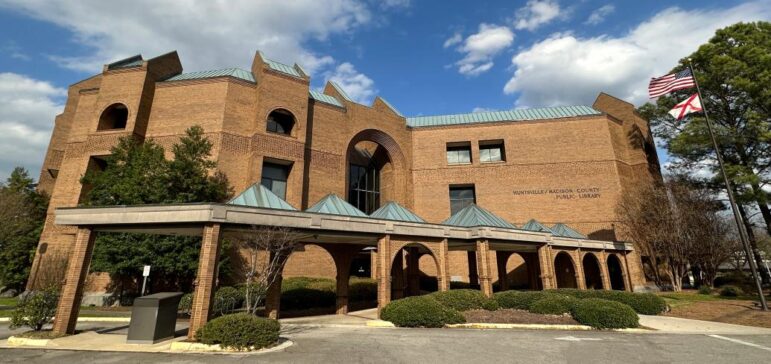
In Alabama, American Library Association data shows only 24 books were challenged last year, but librarians have pushed back against attempts to censor or remove books from their collections.
State libraries are not required to remove challenged books from the stacks or take any action in response to objections raised by citizens. However, some county library administrators have taken their own measures to remove or relocate challenged titles or titles that may potentially be challenged.
The Huntsville-Madison County Public Library in Huntsville, Alabama, directed library staff to relocate 70 children’s titles to the adult section. Only three books on the list did not include LGBTQ+ subject headings, according to the Alabama Political Reporter — one appears to have been included on the list because the author’s last name is “Gay.”
Republican state lawmakers incensed over public libraries choosing to include what they view as objectionable sexual content in children and young adult stacks have stated they’re considering stripping libraries of obscenity law exemptions. This could open county library systems up to censorship and potentially require them to remove some titles from the shelves.
Louisiana
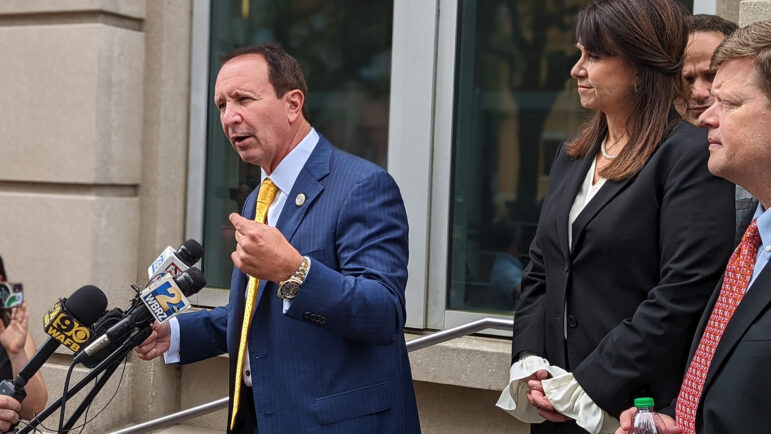
In Louisiana, dozens of book challenges were submitted in parishes across the state — with most targeting books for children and young adults that contain LGBTQ-affirming characters and themes.
More than 100 books were challenged in total last year, according to the ALA, but some were challenged multiple times. For instance, Mike Curato’s “Flamer,” a semi-autobiographical graphic novel for young adults about growing up as a queer man, received four separate challenges.
State Attorney General Jeff Landry, the leading gubernatorial candidate in the run-up to the state’s Oct. 14 election, received notoriety for setting up the “Protecting Minors” tip line in November, asking residents to report complaints about librarians and teachers that connect children with books that contain “inappropriate content.”
“Rest assured that we are committed to working with our communities to protect minors from early sexualization, as well as grooming, sex trafficking, and abuse,” Landry wrote in a Facebook post about the tip line.
Mississippi
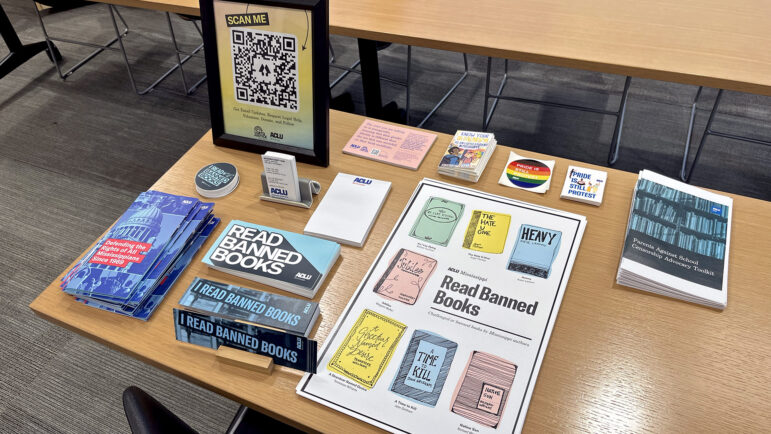
In Mississippi, ALA data shows only about 30 books were challenged last year, but a new law passed in the 2023 legislative session has made it harder for libraries to offer many items digitally — challenged or not.
The law prohibits libraries from contracting with vendors that provide “inappropriate materials depicting or dealing with matters of sex, cruelty and violence in a manner likely to be injurious or harmful to a child.” This means digital resources like OverDrive, Libby, and Hoopla must verify that all the content on the platforms complies with the law.
Hoopla and OverDrive don’t have systems in place to restrict access to certain content for certain age groups, and the legislation’s wording means content like e-books on human anatomy or LGBTQ+ young adult books could violate Mississippi’s law.
It’s not feasible for every title on these platforms to be manually checked and a violation could result in a $500-$5,000 fine — and possibly jail time. In response, many public libraries in the state are left with no option but to ban these resources for minors entirely.
Banned Books Week across the region
![A group of 5th graders waits outside of the Banned Wagon at the [Un]Ban Book Festival at Baldwin & Co. in New Orleans on Oct. 5, 2023.](https://wbhm.org/wp-content/uploads/2023/10/IMG_4854-771x434.jpg)
Local and national groups used this year’s “Banned Books Week” to push back against the increased challenges.
Penguin Random House, the Freedom to Read Foundation, PEN America, and Little Free Library joined together to create the “Banned Wagon,” a converted ice cream truck on a tour across the South handing out hundreds of free banned books and stopping at Little Free Libraries along the way to stock them full of books.
The Banned Wagon stopped at Baldwin & Co., a Black-owned bookstore in the Treme neighborhood of New Orleans, on Thursday alongside the [Un]Ban Book Festival. School children from across the city lined up around the block to get their free copies from a “menu” of 12 banned children’s, young adult and adult books that are most frequently challenged in the U.S.
Carly Gorga, director of brand marketing at Penguin Random House, said “The Bluest Eye” and “I Am Jazz” were the most popular choices at the Banned Wagon’s other stops in Nashville, Tennessee, and Atlanta.
Among the attendees were Ryan Vitry and his dad, Andy Grandpre. Ryan technically missed school to come to the event — but don’t tell anybody. He chose a copy of “Pride,” a picture book about the history of the pride flag.
“I have three moms,” he said. “So that’s really important to me.”
Grandpre chose a copy of “The Immortal Life of Henrietta Lacks” because he’s a researcher and said he wants to share the story with others. Fighting back against book bans is important for Grandpre — even if it means having his son miss school for the day.
“I’m a trans person and a queer person and those things are often banned, and that’s not good for kids growing up to not have access and be able to read stories about people like us,” Grandpre said. “It would have helped me a lot if things were not banned when I was a kid, so it’s really important to me.”
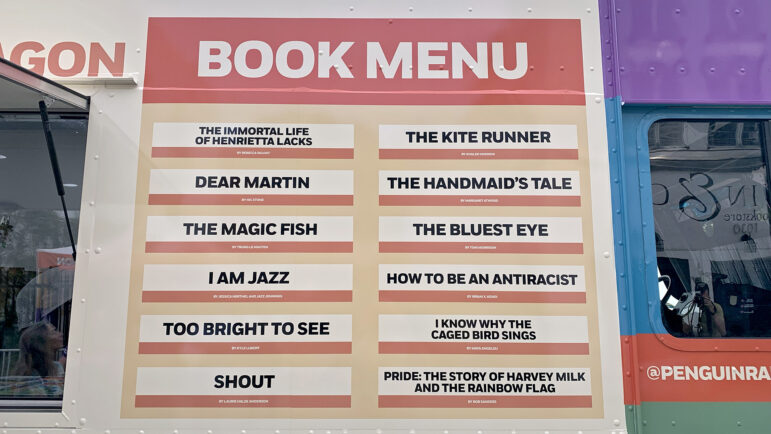
In Columbus, Mississippi, professors, students and librarians gathered at the Fant Memorial Library at the Mississippi University for Women on Wednesday as part of a three-day Banned Books Week event. Students attended sessions that included information on queer rights from the American Civil Liberties Union of Mississippi, and a panel with educators who spoke about challenges they faced in the classroom.
Dr. Ebony Lumumba, the English department chair at Jackson State University, was on the panel and spoke on her work with incarcerated people at the Mississippi State Penitentiary — where she’s facilitated a book club for about two years.
Books can shine a light into the darkness that incarcerated people feel while in prison, she said, but it also fills in gaps in Black history when Black stories went untold.
“I think it is diabolical to erase stories and to remove stories and to create the spaces and gaps that cause questions instead of allowing those to be filled,” Lumumba said. “Many of these stories will make us uncomfortable because as a society, we have engaged in uncomfortable things.”
Moe Moore, who works at the Fant Memorial Library, appreciates that the university created a space for conservations on banned books, many of which include LGBTQ+ characters. Moore said books opened up avenues for her as a trans woman growing up in Louisiana. She used to read a lot of stereotypical books about sports and cowboys, but as she got older, they weren’t enough. She was coming into her own as a trans woman and didn’t see herself in fiction.
“I never saw a Black trans woman in a book,” Moore said. “I never saw a Black trans woman on TV. If I would have got a better representation of a Black trans woman being in love and being loved, then I would have felt better about coming out earlier.”
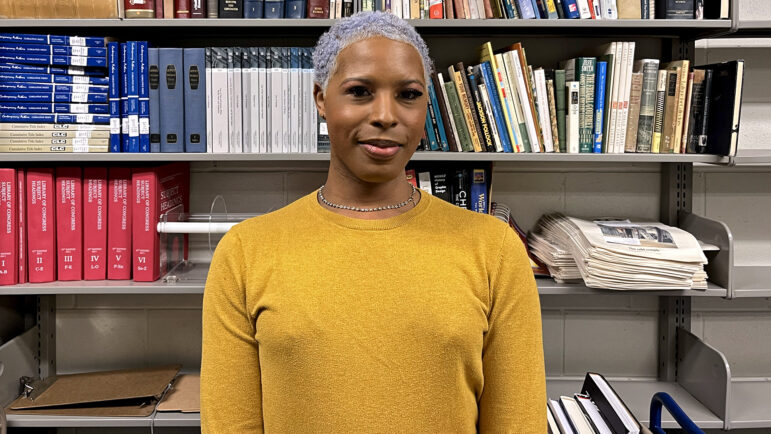
In the U.S., Black trans women endure violence at disproportionately high rates, and trans youth also have high rates of suicidal thoughts and attempts. Moore said she struggled with her mental health as a young adult. She credits authors like Angie Thomas and Alice Walker for helping her process thoughts about police violence in her close-knit community and challenging her ideas of womanhood. Fiction saved her life.
“It is not a joke,” she said. “These representations are not just about books. It’s about helping kids, keeping them alive, and making sure that they’re healthy and happy.”
This story was produced by the Gulf States Newsroom, a collaboration between Mississippi Public Broadcasting, WBHM in Alabama, WWNO and WRKF in Louisiana and NPR.
Scientists make a pocket-sized AI brain with help from monkey neurons
A new study suggests AI systems could be a lot more efficient. Researchers were able to shrink an AI vision model to 1/1000th of its original size.
U.S. evacuates diplomats, shuts down some embassies as war enters fourth day
The United States evacuated diplomats across the Middle East and shut down some embassies as war with Iran intensified Tuesday while President Trump signaled the conflict could turn into extended war.
North Carolina and Texas have primary elections Tuesday. Here’s what you need to know
The midterm elections are officially underway and contests in Texas and North Carolina will be the first major opportunity for parties to hear from voters about what's important to them in 2026.
Trump promised the MAGA base no new wars. Then he went to war with Iran
President Trump promised his "Make America Great Again" voters an "America First" foreign policy. With the war in Iran, he's testing MAGA world's willingness to be flexible on one of its core beliefs.
Kristi Noem set to face senators over DHS shutdown, immigration enforcement
The focus of the hearing is likely to be on how Kristi Noem is pursuing President Trump's mass deportation efforts in his second term, after two U.S. citizens were killed by immigration officers.
College students, professors are making their own AI rules. They don’t always agree
More than three years after ChatGPT debuted, AI has become a part of everyday life — and professors and students are still figuring out how or if they should use it.

![Attendees wait to receive free copies of banned books from the Banned Wagon outside of the [Un]Ban Book Festival at Baldwin & Co. in New Orleans on Oct. 5, 2023.](https://wbhm.org/wp-content/uploads/2023/10/IMG_4825-800x450.jpg)


